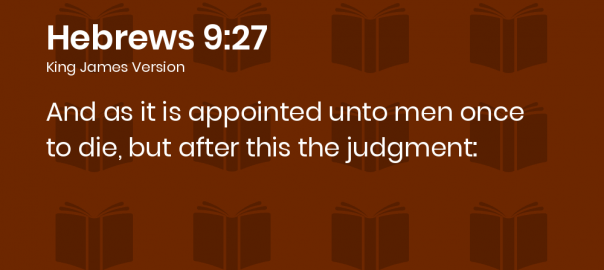[Author’s Note: This essay is about a verse in the ‘Letter to the Hebrews’. No-one is certain who wrote that Epistle, but for the sake of convenience I will here refer to the writer using the masculine pronouns ‘he/him’ and as the ‘writer’ rather than presuming either a name or a gender]
I once wrote a piece about a Bible verse that seems to cause more trouble than any other; the one ‘dratted verse’ found in 2Timothy 3:16 where it supposedly says that ‘all Scripture is God-breathed…’ and about how that verse, or at least the modern-English translation of it, is used as the basis for the infallibility and inerrancy of Scripture, and thence used as a weapon by Christian religious zealots to beat people over the head. Of course. For more on that idea, please see the piece I wrote earlier.
I so wish that verse wasn’t in the Bible 😉
So, then, today’s journey into the mysterious world of misused Scripture texts takes us to the Letter to the Hebrews. Here, in Chapter 9 and verse 27, is found the Other Dratted Verse:

(Heb 9:27)
I so wish that verse wasn’t in the Bible, either 😉
And I’ll tell you for why.
It’s because the verse is regularly used by certain Christians as a proof-text – a Bible verse that supposedly proves a person’s point – for the doctrine that death is some sort of ‘deadline’ (pun not intended; I detest such things!) for fulfilling, well, whatever condition they want to impose on you.
Usually, the thing they are touting is that if a person does not ‘accept Christ’ [or other religious requirement of their choice] before they die, then it’s off to Hell with them, and of course they will naturally have to pay for their own handbasket. And because the verse in question, Hebrews 9:27, appears to support this idea, it has become virtually exclusively the verse used to ‘prove’ that doctrine; in fact I can’t think of another such verse. Like many doctrines, this whole idea tries to negate the concept of God being all-loving and all-merciful, and of course it also reinforces the Hell doctrines that I stand so vehemently against, because the inference is that at this ‘judgment’, everyone will be found guilty and end up going there – apart, of course, from the one preaching, and his denomination, because naturally they alone are the people who have received the ‘one true gospel’ 😉
So, you see, this verse has been used continuously, for some time now, as a high-pressure sales closing technique. Buy your salvation ticket now, folks, because tonight you might be dead and then it will be too late! I could rant about the rights and wrongs of such an approach, but I am a man of mercy and I will spare you. But still the fact remains that generations of pushy evangelists have misused this verse in this pressurising manner, presumably each of them picking up the technique from the ones they have watched and learned from.
And Heb 9:27 is the verse which is used as the proof-text to show that the moments just before death are actually a person’s ‘last chance’ before the opportunity closes. They need to ‘repent!’ by then, or else!
That’s why I wish this verse was not in the Bible!
But that stuff I have written above – is that really what the verse actually means? Or have those Christians simply read into the verse the things they want to see there, as happens so often with other ‘proof-texts’? And would it surprise you if they had? 😉
What else could the verse possibly mean, though, if not the interpretation that we’ve always accepted? Well, we need to look a little closer at the context. If you read the sentence itself, it’s like, ‘Just as it is set for man to die once, and then face the judgement, so also …’ and so on. This shows that the phrase is being used as a comparison (as we will see below); it is not intended as a standalone proof that death is followed by some sort of judgment. The writer is not trying to show that death is the last chance to ‘comply’; he is simply setting up the next part of his argument.
Seeing this important point, then, the first thing we can note from Christianity’s abuse use of this verse is that the first stanza of the verse – the part that contains the point they want to emphasise – is the only part that is generally used. It’s very rare that the quote is continued into the concept it’s being compared to. I think it’s safe to say that most Christians probably can’t quote the rest of the verse as readily as they can the first part. But key to understanding this verse is the knowledge that the writer is using a Hebrew poetic device known as ‘synonymous parallelism’ where he compares two concepts in the same verse. To omit the second part of the verse, as they do when they only use the first part of the verse, is to fail to do the whole verse justice because we will miss the point its writer was originally intending to make. Worse than that, not only does it not do the verse justice, in fact, but also it demonstrates a complete lack of respect for the Scripture and its proper interpretation, which I am absolutely sure is intentional in some cases. Some people will do it from ignorance, sure, but for those who understand the proper exegesis of Biblical texts, they should not interpret that text in the way they have. To deliberately use the text in this way, when you know how to do proper exegesis, is simply dishonest plain and simple. It is extremely clear that the sentence structure is quite deliberate and it is perfectly apparent that ‘parallelism’ is definitely what the writer is doing. The part about dying once and facing judgment has neither meaning nor contextual relevance unless the writer’s argument is continued into the next stanza, so that he can finish what he was saying; the comparison is not complete without continuing the sentence. This should be obvious to any perceptive general reader because v.27 begins with ‘For just as…’ implying that there’s something else to follow the sentence. So, for example, if I said, ‘Just as the sky is blue, so is the ocean’, then that carries meaning. If, however, I just said, ‘Just as the sky is blue…’ it wouldn’t mean anything. ‘Just as the sky is blue, what?’, would have to be our next logical question, because you expect that there will be a conclusion to the comparison. This is the same thing here. ‘Just as it is appointed….so….[something else]’. Now that makes more sense.
So now if you look at the local context, you should be able to see it:

– Heb 9:27-28
Do you see it? It’s quite obvious when it’s pointed out, isn’t it?
Even if you read the header picture for this blog post, with the text on the brown background, you can immediately see that the phrase is not complete, for the reasons already explained. Taking this lack of completeness into account, then, we can see straight away is that the bit about ‘die once and then face judgement’ is actually not the main thrust of the writer’s argument. As already stated, he’s using it as a comparison; as an analogy or even an allegory if you like. He’s saying “Christ’s one-off sacrifice to take away the sins of many people is analoguous to when man dies once [as the quotation claims] and then faces judgment”. He then goes on, in Chapter 10, to expand on the idea of just what the analogy compares to, and all that stuff is really what this Scripture section is all about. The idea of death being a person’s ‘last chance’ is not in any way what is being presented in this context.
I hope that’s clear.
And there’s a fair bit more to it than that. Like, I don’t know if you’ve noticed this, but that idea about ‘die once and face judgment’ is found nowhere else in Scripture. In our verse in Heb 9:27, the writer is not quoting a Scripture passage when he makes this assertion. However, in other passages in the Epistle, where he is making a major point from a premise in his Scripture (to us, that would be what we call the Old Testament), it is obvious that he is quoting Scripture. That such a quotation is not apparent does not of itself mean that it is not a Scriptural idea, of course, but for us nowadays with powerful search tools, we can look and see for ourselves that it is not a text from anywhere else in the entire Bible, in either the Old or the New Testament.
So, if we take that whole context and non-Scriptural quote into account, we see that the verse cannot in fact be used to prove post-mortem punishment or judgement, because a) he’s not talking about this as a way proving it, and b) the context suggests that the phrase is probably an already commonly-accepted idea or some other premise (an ‘axiom‘), and that it is also extra-Biblical in origin – quoted from another source outside the Scripture – because it’s not as if the writer is quoting an Old Testament passage like he does in other parts of his letter. Or like Jesus does when he says ” ‘You have heard that it was said, ‘An eye for an eye…’ ” in Mt 5:38, quoting Ex 21:24. And so, the axiom is not Scripturally founded. Sure, it’s in the Scripture as we know it nowadays, but the writer’s argument is not presented as being from a Scriptural perspective from his point of view, like he does with other points in Hebrews. Maybe it’s folklore or something that he’s got the idea from. Maybe it’s a ‘they say that…[something is true]’. It could be anything. He might as well be quoting the song lyric, “All you need is Love”, for all the Scriptural precedent it has! This idea of ‘die once and then face judgment’ is nowhere near as powerful, nor as conclusive, nor as firmly quoted, as are his Scripture references. In fact, it’s almost as if he simply plucks the thing out of thin air! Where does that idea come from? It is not made clear, which suggests that the writer thinks its veracity unimportant from a doctrinal point of view – because it’s being used as a comparison, not as a doctrinal point.
And the fact that it is in the Bible as we know it today is not sufficient to make it an objective fact, given its context of being a quotation, and especially from an undefined source which was almost certainly not a source which was considered Scriptural when Hebrews was written, else the writer would have made that clear.
This all means, then, that for people to use Heb 9:27 as the sole proof-text that people face judgement immediately after death is nowhere near as straightforward nor as ironclad as they would like to claim. It is an accepted principle of doctrine formation that no major belief/doctrine should ever be founded on a single verse of Scripture, but, sadly, this is what seems to have happened here.
But even if it were true; even if just before death is, as they claim, the last chance a person has to ‘put things right with God’, or whatever other thing they’re trying to push on you, then you would expect it to fit with the entire arc of the Scriptural narrative. But it doesn’t. If we’re going to explore how this idea fits in with other Scriptural concepts, and if Christendom is going to claim (as they so often do) that we should ‘Let Scripture interpret Scripture!’ , then they should take into account other parts of the Scripture. So let’s take a look, shall we?
For me, the major issue with the ‘die once’ idea is this: Christ died, and therefore all died (2Cor 5:14). Everyone has died in Christ already, and it could reasonably be argued that at His death was when that judgement happened, because the death of Christ was God’s judgement on ‘sin’ in that it was nailed to the Cross and destroyed (Col 2:14). Furthermore whoever has died in Him (and that’s everybody, whether they know it or not, under 2Cor 5:14) has passed from death to life and will not be judged.
You see, Jesus said in John 5:24, “Very truly I tell you, whoever hears my word and believes him who sent me has eternal life and will not be judged but has crossed over from death to life”, implying that belief means that they have crossed over from death already, i.e. they have already died, and this is supported by the numerous references made by Paul (especially in Romans; see below for examples) about us being dead, considering ourselves dead, and all that sort of thing. The Greek word for ‘Life’ there is the word ‘zōēn‘ which usually implies life of the eternal quality. And because of that ‘crossing over’, they will not be judged, either.
Now, granted, Jesus is here speaking about those who ‘believe’, and not necessarily about those who do not. But still the points remain: a) all have already died in Christ and therefore have crossed from death to life; b) those who believe, according to Jesus, have already crossed over from death to life because they believe. (There is tension between those ideas, but for Biblical studies and indeed the faith life in general, tension between concepts is the normal state of affairs!) Anyway, it’s analoguous to them having already died, as Paul says in Romans. So, then, for the believer, are they going to face this judgment after having died? In fact if Jesus says that those who have eternal life will not be judged, where then does that ‘judgment’ after death, as claimed in Heb 9:27, come from? Jesus says we will not be judged. This is even more evidence, in my view, that the Heb 9:27 passage is non-Scriptural in its source.
Furthermore, in 1Cor 15:22 it says that ‘…in Adam all die…’ too, but also ‘…’in Christ shall all be made alive’! So, if all die in Adam, which is probably referring to the actual physical death of humans, does that count as the one death after which we face judgment? Is the judgment part of our being originally in Adam, but now we are made alive in Christ – as it says in that verse? Or does it mean that because we are all human? (the Hebrew word meaning ‘Adam’ can also be taken as meaning simply ‘human’, so that it simply means simply being human means we will all, one day, die)
And in other places, like Ephesians 2:2, it says that we were “…dead in our transgressions…”, and then in Eph 2:5 he says God “…made us alive with Christ even when we were dead in transgressions“. Do you see this? It’s almost as if the Scripture is talking about our ‘death’ as being a thing of the past because we died in Christ; when we were dead in our transgressions, God made us alive in Christ. This is a done deal; it is a fait accompli. Of course, harsh religious types would like to deny this incredibly good news, but I have shown directly from their own Rulebook that it fits in with the incredible generosity and completely unfair and unearned Grace of God that this is the sort of thing He would do for us without us even having to ask!
Oh, bless God, this is really such good news! You see how quickly the dark shadows, cobwebs and bad news flee away when we open up the words in the Bible and examine what they really mean, rather than what we thought/have been told they have meant for all these years? And then discover far more glorious truths behind all the whitewashed-tomb stuff the Pharisees would have us believe? How the fear, the dread of death and its supposedly ensuing (and presumably, according to most religious people, adverse) judgment, vanish like smoke on the wind! In fact, I often wonder if this preoccupation with actual physical, bodily death is simply the result of humanity’s innate fear of that death. I therefore wonder if our previous assumptions about the ‘die once’ death in Heb 9:27 is simply due our preoccupation with that bodily death, blinkering and blinding people to the – let’s face it! – almost unbelievable, fantastic truth that as far as God is concerned, somehow we have already ‘died’, and that Jesus has defeated that death once and for all in His own death and Resurrection!
And so it is actually not ‘…appointed for man to die once and then face judgment…’, because there are all these other ‘deaths’ involved too. In other words, which ‘die once’ death are they talking about? Adam’s death? The death of our sinful nature on the Cross, ‘if we died with Him, we shall also live with Him’ (Rom 6:8; 2Tim2:11)? Or maybe the ‘second death’ in Revelation 20:14? If there’s a ‘second death’, then how can it be for man to die once? Granted, when Hebrews was written, Revelation was not a part of any Canon of Scripture, simply because the New Testament did not exist at that time. But it is still clear that the Bible is not clear on this (see what I did there!). And then there’s the idea that we have ‘died to sin’ to take into account too (Rom 6:2; Rom 6:6-7 – I mean come on, Romans 6 is full of this stuff!)
Let’s also remember that, according to Paul, there’s the ‘resurrection body’. Does this all not put into a new light the ideas on the immortal ‘resurrection body’ described by Paul in 1Cor 15:35-58? Can we see how this new body (that we supposedly receive after death) is incompatible with the idea of post-death judgment? According to Paul, our old body is ‘sown corruptible’ but is ‘raised incorruptible’. To me, this means that although our bodies as they are now will physically die, yet we will be raised up in an incorruptible body; a body of perfection, with no sickness, disease or infirmity. And surely one of those infirmities that will be missing when it is raised is the sickness of sin. So, in this alleged post-mortem judgment, what will there be to judge? We are waiting for the redemption of our bodies (Rom 8:23. If God is for us (which, of course, He is!), then who can be against us? (Rom 8:31). Who will bring any charge against God’s elect? It is God who justifies! (Rom 8:33)
Surely this is why we are ‘already judged’, as Jesus said in John 5:24? When we are transformed at death into this new resurrection body, what possible place will there be for sin and judgment? Sin, and therefore the reason for any kind of judgment, will not stick to that new body at all. How in fact can God condemn anyone of whom He said, ‘I will remember their sins no more’ (Heb 8:12, quoting Isaiah 43:25)? No, no-one can bring a charge against God’s elect. If there are no charges, then there can be no judgment, even if that judgment is ‘not guilty’. And in any case, how can that Resurrection body, which is immortal (1Cor 15:50-54) die again? It’s immortal; by definition this means it cannot die. So how can that body ever be subject to a ‘second death’ (Rev 20:14) in response to any adverse judgment?
Can you see it?
From all this, then, it is apparent that in this verse of Heb 9:27, it’s far from the clear-cut, simple idea that ‘you die and then you are judged’ that Christendom has so far espoused without question. Oh, sure, they’ll say ‘well the first death precedes the judgment (for which you are raised up and given a body in which to face that judgment) and then there’s a second death’, but it still doesn’t take away that the actual words they use are ‘man…to die once’ – so what place is there for a second death? And neither does it remove the confusing issue of just which ‘death’ the writer is talking about in our verse in Heb 9:27, nor about how the ‘resurrection body’ is involved.
Of course, the harsh Religious types who love to weaponise this verse will not like these ideas one bit, and as usual it’s not those people who I am trying to convince. They can believe what they want to believe.
But I want to be able to take away, from my ordinary everyday readers who have often been bruised by this verse used by vicious religious types, the fear of death and what follows it. Harsh believers believe in a harsh god. Harsh believers believe the strange idea that god can love you ‘unconditionally’ all your life and then at the very instant that you pass from this world into the next, he instantly becomes a ravening, vicious monster who actually now, all of a sudden, has all along had tacit conditions that you should somehow have known about and that you are now, surprise surprise, going to be penalised for not knowing. And all because of that split instant where your body ceases to function as a living organism any more. Well, according to their own Rulebook, Jesus Christ is the same yesterday, today and forever (Heb 13:8). He doesn’t change, and neither does His Father. It’s almost as if they are trying really hard to make God look bad, once again, whereas in actual fact there is no darkness in Him; none at all (1Jn 1:5). And when Jesus says in Mk 12:27 that “…God is not the God of the dead, but of the living”, and even more significantly in the synoptic passage in Luke 20:38, the text also has the extra detail, “He is not the God of the dead, but of the living, for to Him all are alive“, then that too throws some more confusion into the ‘standard’ interpretation of Heb 9:27 because it blurs the distinction between what we understand as death and how God sees it. If God sees even the ‘dead’ as ‘alive’, where then does that leave us in our exegesis of Heb 9:27?
While I was looking for a suitable header image for this post (the one above the title), I simply put ‘Heb 9:27’ into Googe image search. And most of the references that came up were of the harsh, nasty, horrible-god kind of flavour, and easily demonstrating my point about the ‘deadline’ idea being the main use/abuse/interpretation of this text. You can even clearly see that in many of the cases they have only quoted the first part of the stanza, and thus openly demonstrated that they have ripped the verse out of context.
With this kind of harshness on display, coupled with that sort of unethical, or maybe even deceptive, practice of using verses out of context, is it any wonder that so many people nowadays, in some ways including myself, want nothing to do with Christianity? Try that search yourself; I guarantee that the results will be disturbing 😉 What you will see will be a million miles away from the real love of Christ.
But still my point is demonstrated by those search findings: this is the text used to ‘prove’ that once you’re dead, you’ve run out of time. And I think that in this essay I have managed to show that there is, at the very least, much cause for concern about using this text to prove that idea, and indeed about interpreting the text in the way that it has been interpreted.
I believe I have shown in this piece that even when (and in fact especially because of) taking into account what some Christians refer to as the ‘whole counsel of Scripture’ (Acts 20:27), Heb 9:27 does not categorically mean that when we die physically here on this planet, we go straight to some sort of judgment.
In fact, we could even say, again taking into account the ‘whole counsel of scripture’, that the converse is true, if we assume that God is unconditionally all-loving. I mean, Love never fails (1Cor 13:8). Look at 1Cor 13 and Romans 8:38-39; there is so much in those passages that declares the unilateral strength of God’s love, and its power to keep us in His hands despite anything we do or don’t do, and in spite of man-imposed deadlines. If it says ‘Nothing’ in all creation…can separate us from the love of God in Christ Jesus’, then that ‘nothing’ includes not having made the ‘right decision’ by the time we die. Religious people with an agenda like to qualify the love of God; in a way, to restrict access to that Love, but in fact it is not subject to their provisos or conditions. It’s not now, and it never has been. Unconditional means unconditional. If you introduce a condition, it ceases to be unconditional by definition. And this drives the Pharisees nuts, because they think it’s because of their own righteousness that they are made acceptable to God, even though they would doubtless deny this. This is why the Cross is foolishness to them.
Finally, let me also point out that the sting of death has been drawn:
What we believe is this: If we get included in Christ’s sin-conquering death, we also get included in his life-saving resurrection. We know that when Jesus was raised from the dead it was a signal of the end of death-as-the-end. Never again will death have the last word. (Romans 6:8-10 Message)
On this mountain he will destroy
the shroud that enfolds all peoples,
the sheet that covers all nations;
he will swallow up death forever. (Isaiah 25:7-8)
Here is my summary: The statement in Heb 9:27, that “…man is destined to die once and then face judgment…”, is not a Biblical axiom. That concept is found nowhere else in Scripture unless it is read into it.
The idea of immediate post-mortem judgment is not the main thrust of the argument in the passage forming its context.
The concept of this ‘once’ death is not as clear-cut as it first seems. Which death are we talking about, and what about the ‘second death’ mentioned in Revelation?
There is no place for after-death judgment because a) we are already judged, and b) the ‘resurrection body’ has no place for judgment.
Conclusion: The arguments from this Bible verse ‘proving’ that idea are therefore a flawed premise. Hebrews 9:27 cannot be used as a watertight proof-text to show that human death is the point at which they have run out of time in order to respond to God (or, more usually, to those who claim to be His people). There is no fear in death, because Jesus has defeated it.
Wow! Now that’s good news!
Let me leave you with this beautiful piece of writing from John Spinks, in his superb book ‘Cult Escape‘:
“This perfect unconditional love [of God] does not have terms and conditions, stipulations, requirements, demands, obligations, prerequisites, boundaries, time-scales or laws to obey.
“To receive it, you just have to believe.
“No, not believe to get it, but believe to realise that it is and was already there, waiting patiently for you to open your door and allow it in.
“This is because this perfect unconditional love will not violate your will. It will not push your door down and force its way in. It will not roll its eyes in frustration and get annoyed with you when you refuse to accept its gentle knock on your door. It will not threaten to punish, hurt, or destroy you. There is no fear in this love, absolutely no fear whatsoever, not one iota of fear in fact. There is nothing to be scared of. There is no fear that one day this love will lose patience with you.
“There is no fear that it will ever run out of time. [Emphasis mine – Ed]
“This is because it is eternal, it lasts forever, it never gives up, it never changes, and it never changes its unconditional nature. It never eventually introduces conditions. It never puts you under the remotest form of pressure to conform or obey. It does say follow but only in the meekest, humblest, gentlest of ways, so gentle, just like a still small voice, that if you are making a noise you might not even hear it.
“If man is making a big noise in your life by putting pressure on you, telling you that you are under law, giving you conditions to meet, placing boundaries around your life, expecting you to meet certain requirements, any requirements, tying you into terms and conditions, controlling any aspect of your lifestyle via rules, commanding you to follow him, teaching you that your identity is determined by your level of conformity to his latest dictates, demanding unswerving loyalty to whatever he tells you to believe…..
“…..then you are unlikely to hear the still, small, ever so gentle voice”.
– John Spinks, Cult Escape, Kindle Edition, location 2385
Grace and Peace to you
My previous ideas on post-mortem judgment and the ‘timing’ of ‘repentance’ can be found in this piece from May 2015


 How should we, as believers, use the Bible? Most Western Christians read the Bible like they read other books, starting here to finish there– a rather shallow method, at best.
How should we, as believers, use the Bible? Most Western Christians read the Bible like they read other books, starting here to finish there– a rather shallow method, at best. It seems many people, in my circles at least, are often conflicted by and even turned off from the Bible and it’s many narratives because it sometimes depicts God, to our modern sensibilities, as a self absorbed genocidal tribal deity that is more concerned with his (because God is mostly depicted as a guy) “glory” and reputation than his creation. I get it, because I’ve been there and still wrestle with it and I’m sure I always will.
It seems many people, in my circles at least, are often conflicted by and even turned off from the Bible and it’s many narratives because it sometimes depicts God, to our modern sensibilities, as a self absorbed genocidal tribal deity that is more concerned with his (because God is mostly depicted as a guy) “glory” and reputation than his creation. I get it, because I’ve been there and still wrestle with it and I’m sure I always will. The other day I was chatting with someone about the Bible and I mentioned that I didn’t see the Bible as an inerrant text.
The other day I was chatting with someone about the Bible and I mentioned that I didn’t see the Bible as an inerrant text.







